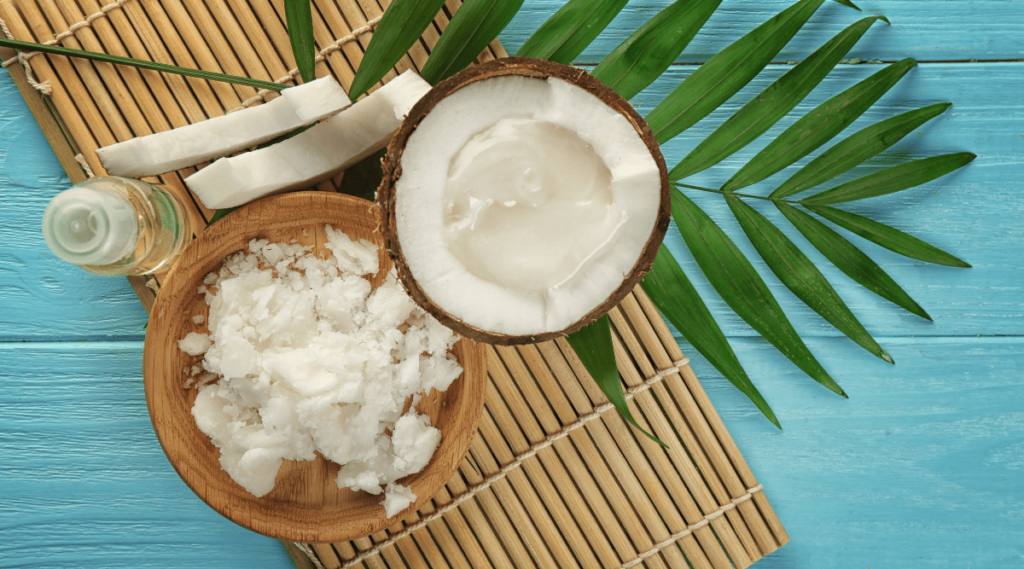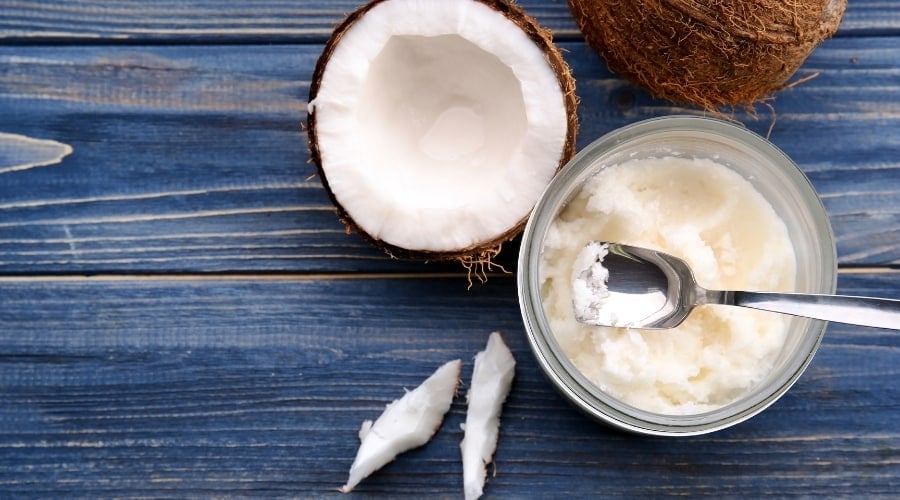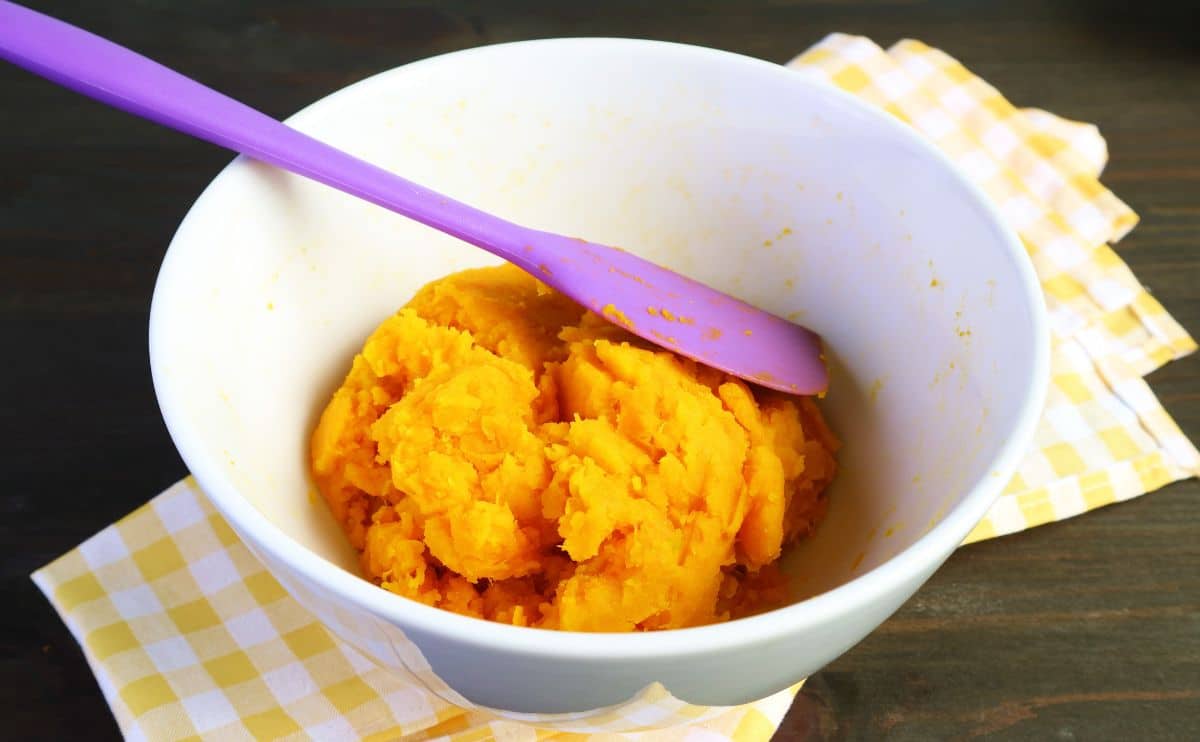Can Dogs Eat Coconut? What About Coconut Milk Or Oil?
When you purchase through links on our site, we may earn a commission. Here’s how it works.
Coconut is a delicious and refreshing treat that we humans love to add a tropical flavor to our diets.
Table of Contents
We love it in baking, drinks, and as a snack, but what about our dogs?
With the great health benefits that we know it offers, we are seeing coconut pop up as an ingredient in many dog treats and grooming products, so it leaves many pet parents asking the question: can dogs eat coconut?
The short answer is yes – dogs absolutely can eat coconut. This delicious fruit is safe and non-toxic to share with our four-legged family members.
Benefits Of Coconut Oil
Although there’s little to no published evidence for it, we assume that the health benefits coconut brings to humans can be shared with our dogs too. Coconut contains a particular type of fat called medium chain triglycerides (MCTs) which are a great source of energy. Coconut oil is well known for keeping skin healthy and moisturized, but it also has strong anti-inflammatory and immune-boosting properties. We are even seeing it added to dog food ingredient lists in recent years.
But even though coconut has all these great benefits, it can also carry some risks that you’ll need to be aware of. As with all foods, it’s vital you speak to your usual veterinarian before making any changes to your dog’s diet.
Is Coconut Safe For Dogs?

The meaty part is safe to feed to your dog, and it’s also safe to feed your dog coconut oil. However, it can cause problems in large amounts. Coconut is very fatty and high in calories, so too much could lead to weight gain and obesity. The high-fat content also means it can cause tummy upsets or trigger pancreatitis. The shell of a coconut or skin of a coconut is not safe for dogs. Although it’s not toxic, it is a choking hazard, so be sure to remove this part.
The one exception is if your dog is allergic to tree nuts. If they are sensitive to other tree nuts, there is a good chance your canine is also allergic to coconuts and thus should avoid them in his diet.
Can Dogs Eat Coconut Oil?
Coconut oil is non-toxic to dogs. In fact, coconut oil is often used in small quantities in dog food and treats. But it’s still only safe in moderation. Like most nuts, too much is fattening and can lead to weight gain and can also cause digestive issues.
Can Dogs Eat Coconut Milk?
Coconut milk is safe and non-toxic to dogs. You need to be careful, though, if you are going to give your dog coconut milk, as many products contain other additives that could cause digestive problems or even be toxic to your pet. For this reason, vets generally don’t recommend coconut milk for dogs.
Is Coconut Good For Dogs?

We know that coconuts have some amazing health benefits for humans. But what about for dogs? There’s very little published evidence and information when it comes to the health benefits of coconut for dogs compared to humans, but we assume much of the same applies to our pets.
Coconut is packed full of fiber, vitamins, and minerals. But remember that if you are feeding your dog a complete and balanced diet, they will be getting all the nutrients they need. Anything else is an extra. But keeping our pet’s diet varied and interesting is very important, and as pet parents, it’s good to know what ingredients we can add to our pet’s food on occasion.
Many of the health claims about coconut are based on the effects of the medium-chain triglycerides (a type of fat) that it contains. Medium-chain triglycerides (MCTs) are a very efficient source of energy as the body is able to absorb and use them right away. But the amount of MCTs varies greatly between different coconut products, so it’s not always a reliable source of these nutrients for your dog.
Anti-Inflammatory Properties
The meaty part of a coconut is packed full of lauric acid, which is a medium-chain fatty acid. The body can utilize this directly as an energy source. But lauric acid also has strong anti-inflammatory properties and is thought to help fight off viruses, yeast infections, ringworm, and giardia. Reducing inflammation in the body helps speed up healing wounds and settles aching muscles and joints. For dogs with arthritis, coconut might help them feel more comfortable.
Supports & Healthy Immune System
Coconut contains large amounts of antioxidants, which help the body to fight off free radicals and prevent cell damage. This can help the immune system to fight infection and support the healthy functioning of your dog’s immune system.
Helps Keep Skin Healthy
Probably the best-known property of coconut oil is its ability to keep the skin healthy. Its antibacterial and anti-inflammatory properties, coupled with its oily nature, make it great for applying to sore or dry skin or to speed up the healing of cuts and wounds. It acts as a moisturizer when applied topically and helps keep the coat smooth and shiny. Coconut oil is frequently found in dog shampoos and conditioners for these reasons. Coconut oil can prove especially helpful for dogs who suffer from skin allergies.
Dangers Of Coconut For Dogs
Although coconut is non-toxic for dogs, it does have some dangers you need to be aware of before feeding it to your pet. Coconut is very calorific, so too much of it can lead to weight gain and contribute to obesity. Moderation is key, so coconut should only be an occasional treat or a small amount of oil used in homemade treats or added to food once in a while.
Coconut has an extremely high-fat content, and although this fat has many health benefits, it can also have plenty of health risks. Too much fat often causes tummy upsets in dogs, including vomiting, diarrhea, and a painful tummy. Too much fat can also trigger episodes of pancreatitis, a serious and painful condition where the pancreas becomes inflamed. If your dog suffers from pancreatitis, you should avoid feeding them any coconut-based products, as even a small amount could set them off.
The meaty part of a coconut, as well as the oil, is safe to feed to dogs in moderation. But the meat should always be chopped up into very small pieces for dogs, as it can be pretty tough to chew. Large chunks of coconut could be a choking hazard. But the biggest choking hazard comes from the shell – you must not feed this part to your dog, as the pieces could become lodged in the esophagus and cause choking or cause obstruction further down in the digestive system. Small fragments of shell could also cause cuts or damage to the inside of your dog’s mouth.
Sweetened coconut, such as that used in baking, should always be avoided as well as coconut milk, coconut yogurt, and coconut sugar. These products could contain additional ingredients that might make your dog unwell. Coconut water can sometimes contain additives, so it’s important to always read the label, but it’s best to feed your dog plain water to keep them hydrated!
How To Feed Coconut To Your Dog

You must always speak to your vet before adding coconut to your dog’s diet so they can advise you on whether it’s suitable for your pet and which products might be safest.
If you want to feed your dog fresh coconut, you’ll need to fully remove the shell and chop it up into very small pieces to reduce the risk of choking and make It easier for them to chew. You could use these chunks as a treat or throw a couple into their usual food at mealtime.
A teaspoon of coconut oil mixed into their food is a great way to get the many benefits that this product offers. You can also use coconut oil as an ingredient in some tasty homemade dog treats to add flavor and bind the ingredients together.
How Much Coconut Can I Feed My Dog?
You should only feed your dog coconut in moderation and as an occasional treat. The best rule to follow is the 10% rule – only 10% of your dog’s daily food intake should be treats; this is to help reduce the risk of weight gain. A couple of chunks of fresh coconut or a teaspoon of coconut oil is plenty, regardless of your dog’s size.
How Often Can I Feed Coconut To My Dog?
Moderation is key with coconut and all treats for our pets. Coconut could be fed as fresh coconut or oil a couple of times a week. Any more than this, and there is a higher chance of your dog getting digestive problems or gaining weight.
Frequently Asked Questions
Is coconut toxic to dogs?
Coconut is safe and non-toxic to dogs but should still only be fed in moderation. Too much can cause tummy upsets, pancreatitis, and weight gain.
Is coconut oil safe for dogs?
Yes, coconut oil is safe for dogs, but only in moderation. A teaspoon added to food a couple of times a week is plenty to avoid tummy upsets and weight gain.
Can dogs drink coconut milk?
Dogs should drink normal still water (bottled or tap) to stay hydrated. Coconut water doesn’t have any extra benefits for their hydration. A little every so often is tasty, but it can contain additives that could make your pet unwell, so always read the label.
Final Thoughts
Coconut is a tasty and refreshing fruit-like nut to offer to your dog, and it’s safe and non-toxic. It has a variety of great health benefits, such as maintaining healthy skin and a shiny coat, boosting the immune system, and reducing inflammation. It can be a great treat fed in fresh chunks, or the oil can be mixed in with food or tasty homemade treats. But you must still always remember that coconut is only good for your dog in moderation, too much can cause tummy upsets, pancreatitis, and weight gain, and the shell can be a choking hazard. Avoid coconut milk and coconut sugar, and always chat with your vet before adding coconut to your dog’s diet.



